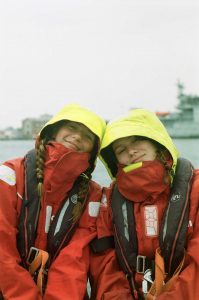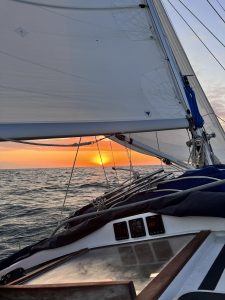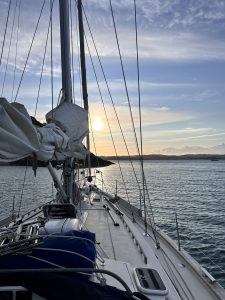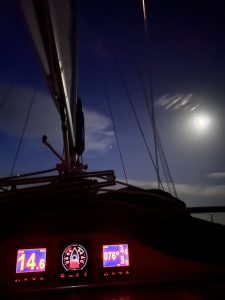Funded Participant:
Petty Officer Cadet Philippa GRIFFITHS, Sea Cadet Corps
Purpose of Expedition:
To experience how to live and work on a yacht whilst living in close quarters with other cadets.
Outcomes of Expedition:
Duke of Edinburgh’s Award Gold Expedition – completed
RYA Day Skipper (Theory) Award – completed
SCC Advanced Navigation – completed
SCC Cadet Navigation Instructor – pending approval
Planned Impact of Expedition:
To improve teamwork and leadership skills in preparation for the Westminster Award Expedition Week in Cornwall from 27/07 – 08/08. Learn how to work with others on a boat as a taster for a career in the Royal Navy.
Introduction
Due to a technical issue with TS Sir Stelios’ sister yacht, there was only one boat running with 2 groups of Cadets doing their qualifying expedition. This meant that one week was spent sailing aboard TS Sir Stelios doing the expedition and the other aboard TS John Jerwood alongside in Gosport enhancing navigation skills
Personal Report
My expedition started off on the afternoon of Saturday 8th July at Brixham Marina where TS Sir Stelios was berthed. Myself and the other 5 cadets got straight into the pre-voyage training that is required such as learning how to work the winches, what to consider when doing engine checks and different types of safety equipment and when to use them. Due to a technical issue with TS Sir Stelios’ sister yacht, there was only one boat running with 2 groups of Cadets doing their qualifying expedition. This meant that one week was spent sailing aboard TS Sir Stelios doing the expedition and the other aboard TS John Jerwood alongside in Gosport enhancing navigation skills.
The Sunday morning was spent doing some more training and brief theory work on basic navigation which would set us up to do our own passage planning for the future voyage. After lunch, we ventured out of the marina to practise our helming, tacking and gybing skills. This was vital for the oncoming days. That night we picked up a mooring inside Fishcombe Bay.
The voyage resumed at 0200 the next morning where we set off from Fishcombe. This particular passage was to last 12 hours and finish at Weymouth Marina. It was vital that the crew stayed motivated throughout the day so that we could stay within ideal tidal streams particularly around Portland Bill.
Our next destination was Studland Bay where we anchored for the night. Due to the strong gusts of wind, we all thought it’d be best to keep an anchor watch. This included taking frequent 3-point fixes and monitoring our position as shown on the chart plotter. Being on anchor watch was psychologically challenging for all of us as we had suddenly taken responsibility of a £500,000 yacht. However, we all supported each other with our different night watches which increased our self-esteem.
The following day was an exciting part of our expedition – we were sailing down a channel called The Needles which is one of the entrances into the Solent. There were south-westerly gales and a strong tidal stream, causing large swells of 5m. The crew displayed great teamwork throughout this leg, even when there were difficulties. TS Sir Stelios berthed at Lymington that night.
The next day was spent sailing through the Solent which ended up being a huge part of our expedition. Our aim was to identify different types of marine traffic and the Solent provided a large variety of vessels, ranging from Royal Navy vessels to vintage tall-ships. Our marina of choice that night was on the River Hamble.
On our final day, we ventured around Portsmouth Harbour where we were greeted by HMS Defender and HMS Diamond along with some frigates and Royal Fleet Auxiliary ships. It was amazing to see them up-close on the water.
One of the most important parts of the expedition was the need for teamwork and good communication. At the beginning of the week, we were 6 strangers. By the end, we were all such good friends who got along so well and got the job done when it was needed. It was essential that we worked well as crew in order to complete the expedition, no matter how enclosed the living quarters were.
For me, it was super important to get experience living with people in confined spaces and maintaining a level-headed approach to all situations where there was contradiction.
Personal Outcomes
Improved communication, teamwork, and leadership skills. Increased confidence and self-esteem with my sailing and coastal navigation. Gold D of E Qualifying Expedition. RYA Day Skipper Theory. SCC Advanced Navigation and Cadet Navigation Instructor.
“Without the support of the Ulysses’ Trust, none of this would have been achieved. The funding has allowed me to not only gain real-life qualifications, but I also get to experience first-hand what it’s like to skipper and crew a yacht which will give me an immense advantage with my future career in the Royal Navy in relation to both leadership and followership.”
Petty Officer Cadet Philippa GRIFFITHS, Sea Cadet Corps
Unit Commanding Officer’s Observations & Feedback Received
As POC Griffiths mentioned at the start of her report one of the main challenges from this voyage was the lack of a second yacht to enable both crews to sail together. This was a short-notice problem that the SCC Offshore Team worked hard to resolve and find a suitable solution for. Nevertheless, Griffiths took this setback in her stride, never yielding in the face of adversity and seeking solutions and striving constantly to not just meet expectations but to excel.
From 20 years of volunteering within the Sea Cadets, POC Griffiths stands out as an exemplar cadet, role-modelling key skills and behaviours that others emulate. She’s a natural leader, is adaptable and her warm personality is engaging.
Participating in this voyage means so much more than achieving a navigation qualification from the RYA or ticking the Gold expedition box for her DofE. Living in small, cramped quarters on any vessel will test even the strongest of wills. Planning and delivering the expedition meant top-notch leadership and even stronger levels of followership skills on show for the assessors.
Feedback received from the Deputy Head of Offshore Training for the Sea Cadets included this rather telling observation in a follow-up email to POC Griffiths’ parents after the voyage:
“…I am writing to express how utterly impressed I was regarding your daughter’s overall performance during the Duke of Edinburgh Expedition over the last two weeks… She led her group superbly, never needing to raise her voice or losing her temper, she is a leader through and through.”
I have little doubt that POC Griffiths applied many lessons from her fortnight’s afloat expedition to the Westminster Award Expedition in Cornwall arranged afterwards by the Cadet Vocational College (CVC). Feedback received from the Chief Executive of CVC said,
“It would be fair to say that this has changed Philippa’s life, making her much more aware of all that is around her and the effect of poor leadership on a team especially when under pressure…She has maturity, common sense, team leading abilities and is willing to take on any task that is given to her.”
I’d like to thank the Ulysses Trust for enabling this outstanding cadet to shine in an environment she previously had no experience of, and in doing so empowering her to utilise those critical life-lessons quickly and effectively afterward within a completely different environment and context.
Your generosity has benefitted one cadet directly, but also so many more due to the power of personality: I have a whole Unit of cadets who have been boosted by Griffiths’ success and who’s own aspirations have grown as a result. And that is priceless.




